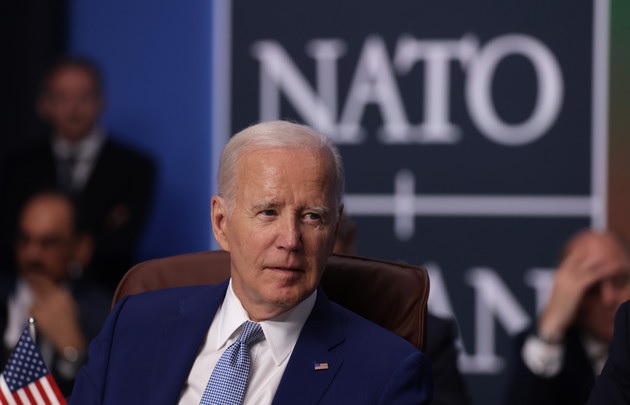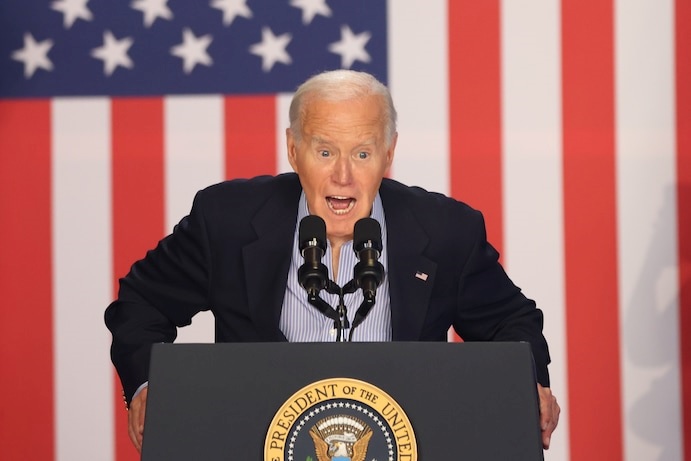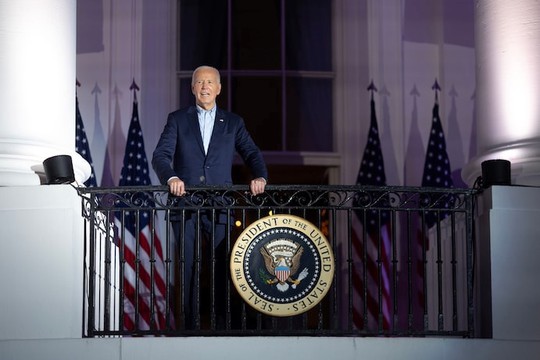President Biden watches the Fourth of July fireworks from the White House balcony.
Photo: The Washington Post
A prominent group of political donors, civic leaders and business executives founded to protect the institutions of American democracy sent a letter Friday morning to President Biden calling on him to “cement your legacy” by ending his bid for reelection. The letter sent to the White House is the latest outreach from the donor and activist community pushing for a new nominee after the president’s debate performance, writes ‘The Washington Post’.
“We respectfully urge you to withdraw from being a candidate for reelection for the sake of our democracy and the future of our nation,” wrote 168 signatories to the private letter, which continued to gain signatures after its delivery to senior White House officials.
The letter was organized by Leadership Now Project, a group founded in 2018 in response to rising concerns about threats to democratic norms. It was delivered to multiple White House advisers, said a person familiar with the effort, who spoke on the condition of anonymity to describe the private communication.
Among the signatories is Christy Walton, the billionaire daughter-in-law of Walmart’s founder; retired NFL commissioner Paul J. Tagliabue; billionaire investor Mike Novogratz; former Google executive Ning Mosberger-Tang; Warburg Pincus Managing Director Harsha Marti; Harvard Law School professor Lawrence Lessig; New York University professor and podcaster Scott Galloway; Weyco Group CEO Tom Florsheim; former Army secretary Louis Caldera and hedge fund investor Kevin Brennan of Bridgewater Associates. Vicky Hausman, the CEO of Forward Majority, a group that supports Democrats in state legislative elections, also signed.
Daniella Ballou-Aares, the CEO of the Leadership Now Project who worked in the Obama administration, declined to comment Friday on the letter.
“Our number one concern is the risk that former president [Donald] Trump presents to the economy, to national security and the risk that he undermines rule of law,” Ballou-Aares said on CNN. “We are also engaging with members of the House and the Senate making our concerns known.”
She said if Biden remains the nominee, she expects all of the group’s members will continue to support him against Trump. She also said that Biden is now far more likely to lose than win if he remains the nominee.
The White House referred a request for comment to the Biden campaign, which responded with a statement about the president’s accomplishments and Trump’s unfitness for office.
The letter the group delivered Friday praised Biden’s decades of public service.
“As members of the Leadership Now Project, and like-minded business and civic leaders committed to protecting American democracy, we have been vocal about the threats posed by a second term of Donald Trump. The risks to America are profound: global and domestic instability, abandoning our allies, crony capitalism, political retribution, and further erosion of the rights of women and other groups,” the letter said.
“At this consequential moment for our nation, it is time to cement your legacy by passing the torch — just as George Washington did,” the letter added.
 NATO allies are quietly questioning how much longer President Joe Biden can muster American support for Europe’s defense?
NATO allies are quietly questioning how much longer President Joe Biden can muster American support for Europe’s defense?
Photo: Getty Images
Diplomats and world leaders preparing for NATO summit 9-11 July are privately expressing acute concern about President Joe Biden’s age, health and ability to win the 2024 presidential election.
These foreign officials largely favor Biden’s reelection and fear that Donald Trump’s return to office would damage the NATO alliance and cripple the war effort in Ukraine. But they have reacted to Biden’s recent debate performance with dismay and fear that Biden may be too frail to defeat Trump and lead a global superpower.
POLITICO spoke with 20 people connected to NATO or the alliance’s upcoming summit over the past month and heard that many allies already had quiet reservations about putting their trust in Biden well before the debate. Now, Biden must convince his counterparts that he’s not only up for the fight but will overcome a political crisis to stay in it.
“It doesn’t take a genius to see that the president is old,” said one official from a European NATO country. “We’re not sure that, even if he wins, he can survive four years more.”
Others went further. “It was painful to watch, let’s be honest,” an EU official said of the debate. “We all want Biden to have a second term to avoid dealing with Trump again, but this isn’t really reassuring.”
Biden already had a tough sell ahead of him at the NATO summit, where he was preparing to face questions from allies about America’s commitment to Ukraine. But his catastrophic debate against Trump has turned the gathering into a different kind of assessment of Biden’s physical and political resilience.
Few European leaders have addressed Biden’s age on the record. But Donald Tusk, Poland’s centrist prime minister, offered an extraordinary public expression of alarm after the debate, telling reporters: “They definitely have a problem. The reactions have been unambiguous.”
The questions swirling around Biden’s candidacy have turned a summit billed as a celebration of NATO’s landmark 75th anniversary into another stress test for a president whose political future hangs in the balance.
Biden will have to very publicly show off his leadership skills and stamina at the summit in Washington, which begins Tuesday morning and runs through Thursday in what’s forecast to be sweltering heat. As the host, he won’t be able to skip events.
Among NATO allies’ concerns is how much longer Biden can muster American support for Europe’s defense, especially after what is likely to be a close election against a Republican former president who is skeptical of assisting partners abroad.
“We’re having more conversations about our own defenses since it looks like Trump is coming back,” an official from a NATO country said after the debate.
On top of that, some NATO allies aren’t wholly satisfied with Biden’s leadership.
“Is the U.S. leading or is it just taking part like everyone else?” asked a senior European diplomat in Washington. The grumbles mainly come from hawkish alliance members — typically in Europe’s east — who want military aid to flood Ukraine without limits on Kyiv’s use of it.
Biden’s electoral crisis comes amid political changes in other major NATO powers: British voters installed a new prime minister, the center-left Keir Starmer, just days ago. France holds elections on Sunday that could strengthen the far right and derail Macron’s presidency. German Chancellor Olaf Scholz is already seen by many as a lame duck following June’s EU elections that badly weakened his political coalition.
Ian Bremmer, the president of the Eurasia Group, said he has directly heard fears about Biden’s status from many G7 and European leaders. “Ukraine is still the most important topic,” he said, “but concerns about Biden and growing panic from Europeans about Trump are increasingly distracting the substantive conversations.”
 President Biden at a rally in Madison, Wis., on Friday.
President Biden at a rally in Madison, Wis., on Friday.
Photo: The Washington Post
Just the day before, ‘The Wall Street Journal’ had published a report that described how the president’s “frail” appearance and inconsistent “focus and performance” presented challenges on the world stage. At the G7 summit in Italy in June, Biden had the distinction of being the only world leader who did not attend a private dinner party where candid diplomatic talks would happen off-camera.
At a European Union summit in Washington in October, Biden “struggled to follow the discussions” and “stumbled over his talking points” to such a degree that he required the intervention of Secretary of State Antony Blinken. (The White House denied the Journal’s reporting,) writes Olivia Nuzzi, a ‘The New York Magazine’ Washington correspondent.
In January, I began hearing similar stories from Democratic officials, activists, and donors. All people who supported the president and were working to help reelect him to a second term in office. Following encounters with the president, they had arrived at the same concern: Could he really do this for another four years? Could he even make it to Election Day?
Uniformly, these people were of a similar social strata. They lived and socialized in Washington, New York, and Los Angeles. They did not wish to come forward with their stories. They did not want to blow a whistle. They wished that they could whistle past what they knew and emerge in November victorious and relieved, having helped avoid another four years of Trump. What would happen after that? They couldn’t think that far ahead. Their worries were more immediate.
When they discussed what they knew, what they had seen, what they had heard, they literally whispered. They were scared and horrified. But they were also burdened. They needed to talk about it (though not on the record). They needed to know that they were not alone and not crazy. Things were bad, and they knew things were bad, and they knew others must also know things were bad, and yet they would need to pretend, outwardly, that things were fine. The president was fine. The election would be fine. They would be fine. To admit otherwise would mean jeopardizing the future of the country and, well, nobody wanted to be responsible personally or socially for that. Their disclosures often followed innocent questions: Have you seen the president lately? How does he seem? Often, they would answer with only silence, their eyes widening cartoonishly, their heads shaking back and forth. Or with disapproving sounds. “Phhhhwwwaahhh.” “Uggghhhhhhhhh.” “Bbbwwhhheeuuw.” Or with a simple, “Not good! Not good!” Or with an accusatory question of their own: “Have you seen him?!”
Those who encountered the president in social settings sometimes left their interactions disturbed. Longtime friends of the Biden family, who spoke to me on the condition of anonymity, were shocked to find that the president did not remember their names. At a White House event last year, a guest recalled, with horror, realizing that the president would not be able to stay for the reception because, it was clear, he would not be able to make it through the reception. The guest wasn’t sure they could vote for Biden, since the guest was now open to an idea that they had previously dismissed as right-wing propaganda: The president may not really be the acting president after all.
Others told me the president was becoming increasingly hard to get ahold of, even as it related to official government business, the type of things any U.S. president would communicate about on a regular basis with high-level officials across the world. Biden instead was cocooned within mounting layers of bureaucracy, spoken for more than he was speaking or spoken to.
Saying hello to one Democratic megadonor and family friend at the White House recently, the president stared blankly and nodded his head. The First Lady intervened to whisper in her husband’s ear, telling him to say “hello” to the donor by name and to thank them for their recent generosity. The president repeated the words his wife had fed him. “It hasn’t been good for a long time but it’s gotten so, so much worse,” a witness to the exchange told me. “So much worse!” – notes Olivia Nuzzi.
read more in our Telegram-channel https://t.me/The_International_Affairs

 11:13 08.07.2024 •
11:13 08.07.2024 •























